Calcijoint D3 Capsule 4’S
CALCIJOINT D3 CAPSULE contains Cholecalciferol which belongs to the group of medicines called Vitamin D analogs. It is a form of vitamin D used in the prevention and treatment of vitamin D deficiency conditions and for certain bone conditions such as thinning of the bone (osteoporosis) which will be given to you with other medicines.
Deficiency of vitamin D may occur when your diet or lifestyle does not provide you with enough vitamin D or when your body requires more vitamin D (for instance when you are pregnant).
Along with this treatment, your doctor might advise you to eat and drink foods that are rich in calcium. Your doctor might want to take certain blood tests prior to the treatment to understand the existing condition.
CALCIJOINT D3 CAPSULE is not recommended for use if you have high levels of calcium in your blood (hypercalcaemia) or urine (hypercalciuria), are suffering from liver problems, kidney failure, kidney stones or have a tendency to form kidney stones, high levels of vitamin D in blood (hypervitaminosis).
Before taking CALCIJOINT D3 CAPSULE, inform your doctor if you have any kind of heart disease or narrowing of the arteries, sarcoidosis (a multisystem chronic inflammatory condition which can affect your lungs, heart and kidneys) or if you are taking any medicines or food containing vitamin D.
CALCIJOINT D3 CAPSULE should be used with caution among women who are pregnant and breastfeeding because too much vitamin D may harm your baby. CALCIJOINT D3 CAPSULE can only be given to children and adolescents aged 12 and above. Consult your doctor if you experience any unusual side effects during treatment with this medicine.
USES OF CALCIJOINT D3 CAPSULE
- Prevents or treats vitamin D deficiency
- Treats osteoporosis (thinning of the bone) along with other medicines
HOW CALCIJOINT D3 CAPSULE WORKS
CALCIJOINT D3 CAPSULE helps the body to absorb calcium and phosphorus by increasing their absorption from the gut and reducing the amount removed by the kidneys and is a fat-soluble vitamin.
DIRECTIONS FOR USE
Take CALCIJOINT D3 CAPSULE as advised by your physician. Swallow CALCIJOINT D3 CAPSULE with a glass of water. Do not crush or chew the medicine. Your doctor will decide the correct dose and duration for you depending upon your age, body weight and disease condition.
SIDE EFFECTS OF CALCIJOINT D3 CAPSULE
UNCOMMON
- Increased calcium in the blood (hypercalcaemia) (signs include nausea or vomiting, loss of appetite, constipation, stomachache, feel very thirsty, muscle weakness, drowsiness or confusion)
- Increased calcium in the urine (hypercalciuria)
RARE
- Skin rash
- Itching
Stop taking CALCIJOINT D3 CAPSULE and contact your doctor immediately if you experience any of the following side effects:
- Swollen face, lips, tongue or throat
- Difficult to swallow and breathe
- Raised itchy rash (hives)
HOW TO MANAGE SIDE EFFECTS
Skin rash:
Do not scratch the affected area. Wear protective clothing while going outdoors. Regularly moisturize your skin. Consult your doctor if the symptoms worsen.
WARNING & PRECAUTIONS
PREGNANCY
CALCIJOINT D3 CAPSULE should be used with caution in pregnant women or women planning to have a baby. Consult your doctor before taking it. If you require extra vitamin D do not take it without medical supervision because too much vitamin D may harm your baby.
BREASTFEEDING
CALCIJOINT D3 CAPSULE should be used with caution in breastfeeding women. Consult your doctor before taking it. If you require extra vitamin D do not take it without medical supervision because too much vitamin D may harm your baby.
DRIVING AND USING MACHINES
CALCIJOINT D3 CAPSULE does not affect your ability to drive or use machines. Consult your doctor before taking it.
KIDNEY
CALCIJOINT D3 CAPSULE is not recommended for use in patients with kidney failure, kidney stones (renal calculi) or have a tendency to form kidney stones. Consult your doctor before taking CALCIJOINT D3 CAPSULE.
LIVER
CALCIJOINT D3 CAPSULE should be used with caution in patients with liver disease. Dose will be adjusted by your doctor. Consult your doctor before taking CALCIJOINT D3 CAPSULE.
ALLERGY
CALCIJOINT D3 CAPSULE is not recommended for use if you are allergic to Cholecalciferol or any other ingredients of this medicine.
HEART DISEASE
CALCIJOINT D3 CAPSULE should be used with caution in patients with heart disease or narrowing of the arteries. Consult your doctor before taking CALCIJOINT D3 CAPSULE.
OTHERS
CALCIJOINT D3 CAPSULE is not recommended for use if you:
- Have high levels of calcium in the blood (hypercalcaemia) or urine (hypercalciuria)
- Have high levels of vitamin D in the blood (hypervitaminosis D)
Before taking CALCIJOINT D3 CAPSULE, inform your doctor if you:
- Have sarcoidosis (a multisystem chronic inflammatory condition which can affect your lungs, heart and kidneys)
- Are taking medicines containing vitamin D or eating foods or drinking milk enriched with vitamin D
Use in Pediatrics:
CALCIJOINT D3 CAPSULE is recommended for children and adolescents aged 12 and above. Dose will be adjusted by your child’s doctor. Consult your child’s doctor before taking CALCIJOINT D3 CAPSULE.
INTERACTIONS
A. Drug-Drug Interactions:
Before taking CALCIJOINT D3 CAPSULE, inform your doctor, if you are taking any of the following medicines:
- Medicines used to treat epilepsy (Ex. carbamazepine, phenobarbital, phenytoin, primidone)
- Other vitamin D containing medicines including multi-vitamins
- Medicines to control the rate of your heartbeat (Ex. digoxin, digitoxin)
- Diuretics (water tablets) (Ex. Bendroflumethiazide)
- Calcium supplements
- Medicines used to treat tuberculosis (Ex. rifampicin, isoniazid)
- Medicines leading to fat malabsorption (Ex. orlistat, cholestyramine, liquid paraffin)
- Medicines used to treat fungal infections (Ex. ketoconazole, itraconazole)
- Actinomycin (medicine used to treat some forms of cancer)
- Glucocorticosteroids Ex. hydrocortisone or prednisolone (used to treat inflammatory conditions)
Overdosage:
If you or anyone else accidentally takes too much of CALCIJOINT D3 CAPSULE, consult your doctor immediately or visit the nearby hospital. Signs of overdose include loss of appetite, thirst, nausea, vomiting, constipation, abdominal pain, muscle weakness, tiredness, confusion, having to pass more urine than usual, bone pain, kidney problems and in severe cases it may cause irregular heartbeat, coma or even death.

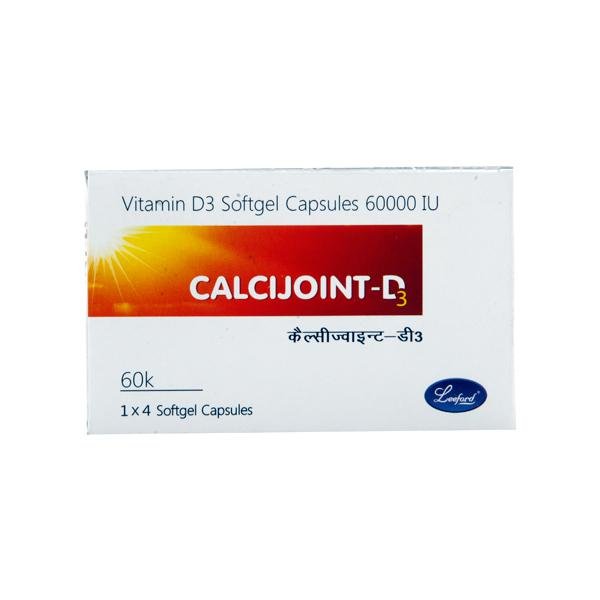
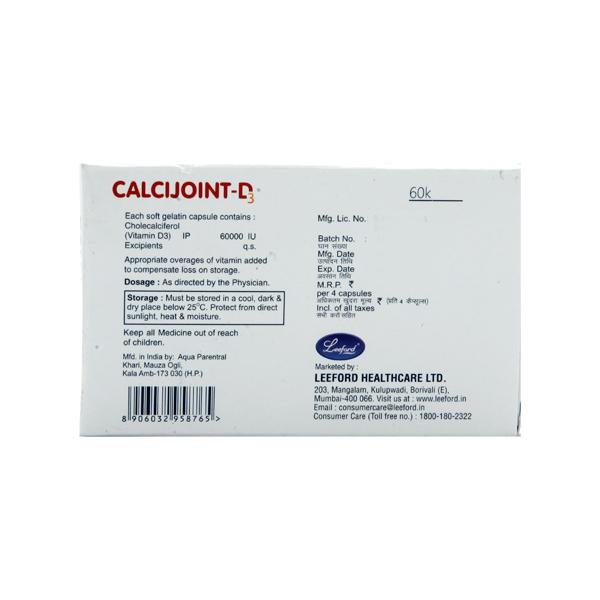

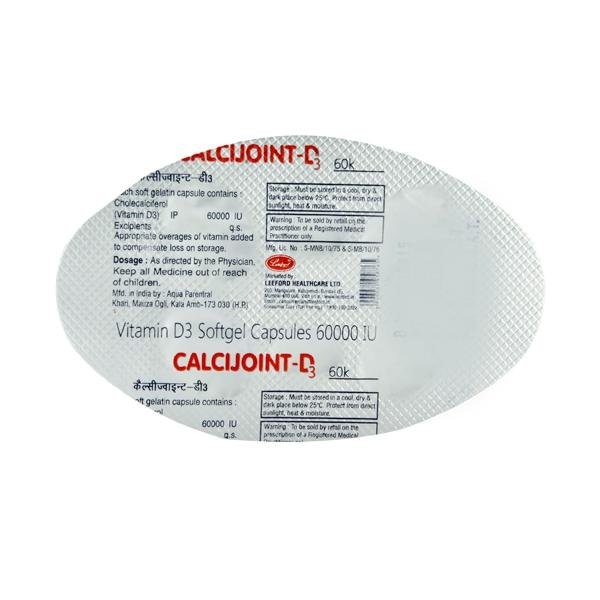

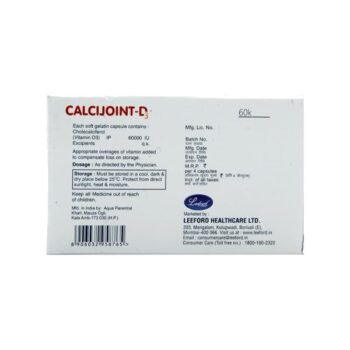

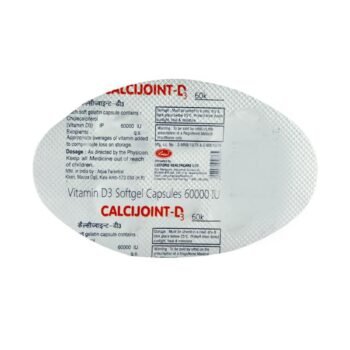



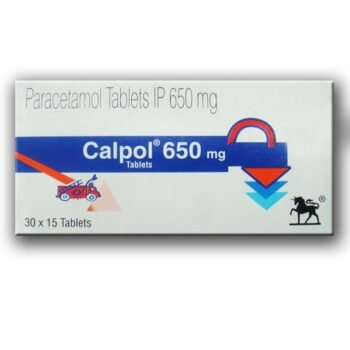
Real customer reviews